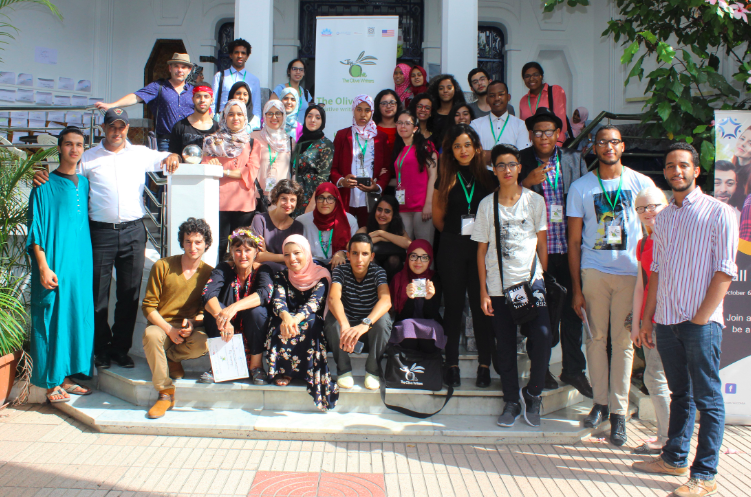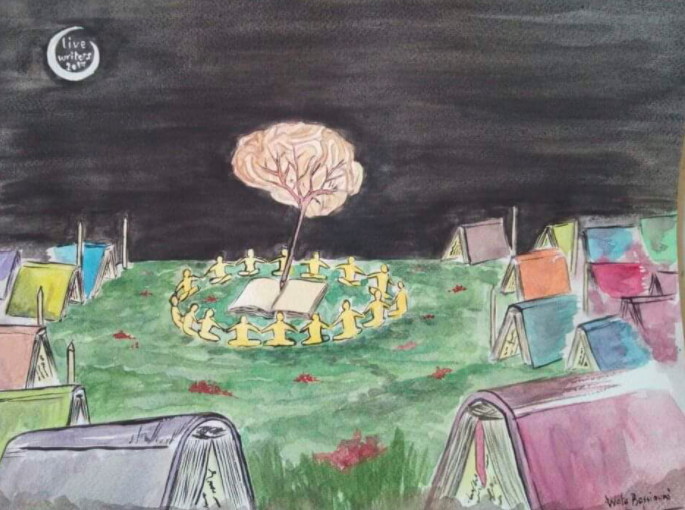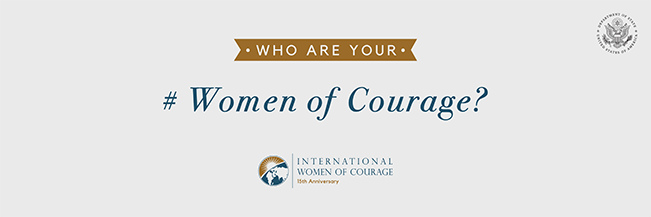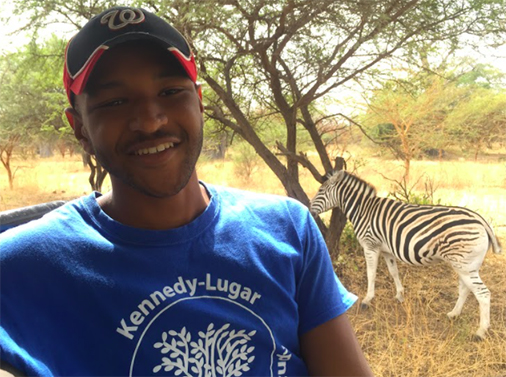Before applying to Between the Lines, Mohammed El Wahabi had never heard of an exchange program. "It was my first time knowing about exchange programs, and I was so surprised that such things existed!" Mohammed participated in the 2015 Between the Lines Program: Peace and the Writing Experience, administered by the International Writing Program (IWP) at the University of Iowa through a grant from the Cultural Programs Division of the U.S. Department of State. A year later, he became the founder and executive director of the Olive Writers, a writing program for Moroccan youth in his home city, Casablanca.
The mission of the Olive Writers is embodied in its name. Alongside the symbol of the olive tree as a tree of peace, "Olive Writers" is a pun for "All of writers," symbolizing the inclusivity of the program. The abbreviation of the Olive Writers, TOW, symbolizes the program's mission to tow Moroccan writers towards a better future, better life and better Morocco. The alumni of the program are called Towers, because they embrace the values of the Olive Writers (creativity, tolerance, equality, diversity, compassion, empathy, and courage) and take them beyond the confines of the program as leaders in their communities.
Mohammed's inspiration to start the Olive Writers program began before Mohammed was accepted into the Between the Lines program, when he met the other applicants at the AMIDEAST Center in Rabat during the application process: "That was very surprising because I never thought I would meet such young Moroccans, the same age as me, who loved the same things I did. When I met them, it was such a beautiful experience connecting and just knowing that I belonged to a rather big community within the same country." Mohammed and the other applicants quickly became friends and although Mohammed was the only one accepted into the Between the Lines program, their initial meeting planted the roots of a literary community that Mohammed would go forward to grow through the Olive Writers.
He came home from the program with the realization that "we are allowed to dream, and those dreams can come true." Mohammed was especially fascinated by the ability of programs like Between the Lines to bring so many different people together through a common passion: "It was interesting to me to see that being literature lovers, readers and creative writers was the main thing that brought us together despite all our differences." This realization inspired Mohammed's plan for the Olive Writers as well: "In Morocco, we exist asvery different subcultures within the same country. We come from different places, we have different ethnicities, and we also speak different languages including Darija, Amazigh, French and Spani sh ... When we are writers, and we love literature, and when we write, it becomes, somehow, a new identity for all of us that's better and deeper and much more interesting than our small differences and labels."
Participating in the Between the Lines program opened his eyes to the empowering impact of such programs on youth: "I got to see first hand to what extent nurturing environments can help bridge people together- how we became friends very quickly and how the program is designed with the literature, creative writing, activities, and tours. I loved that! But at the same time, I felt sad that we don't have such things in Morocco."
During the Between the Lines program, Mohammed asked Egyptian writer and Between the Lines chaperone at the time, Nesma Gewili, "Why don't we have such programs in Morocco and the Arab world in general?" She said it was sad that they have to travel so far to experience these things.
"I said, 'you know what... I'll do the same thing in Morocco and invite you.' Maybe she thought it was just something an 18-year-old would say out of excitement, but two years later I sent her an official invitation," Mohammed said. Nesma taught at the first Olive Writers summer camp in Casablanca during 2017.
Mohammed credits the alumni resources and exchange alumni network provided by the US Embassy in Morocco for inspiring him to bring the idea of the Olive Writers to reality. The alumni reintegration seminar and resources pushed him to build on what he learned, create impact in his local community, and network with alumni. He credits Loubna Arrach, the alumni coordinator at the US Embassy in Morocco, for her role in "connecting us, inspiring us, and letting us know what is available for us."
Mohammed also thanks the American Language Center Casablanca, which has housed the Olive Writers camps since its inaugural session in 2017. The American Language Center Casablanca has provided the Olive Writers with venue, funding, network and all forms of support. "I am very grateful to Richard Martin, the director at the American Language Center Casablanca, who has offered so much to the Olive Writers. His mentorship to me personally and his unflagging support to the Olive Writers made a huge difference," said Mohammed.
The Olive Writers was created with the mission to "empower writers at all levels by connecting them and providing them with opportunities for personal and professional development. We do this through workshops, camps, competitions, and introducing them to international networks of writers. Our main focus is building community around creative writing, encouraging reading in Moroccan societies, and liberating writers to advocate for the issues that matter to them."
Mohammed saw the Olive Writers as a way to give a voice to young Moroccans in under-resourced and disenfranchised communities by providing a nurturing space to express their ideas, especially young girls. He created the Olive Writers to be a safe space for all Moroccan youth, especially those who are marginalized, to connect with others despite their differences. He expressed that "when we connect young writers to established writers, to established artists, and to people who have done so much in the art field, they become more open to the idea of living creatively. That sort of spirit and mindset helps them succeed in any career, even if they don't follow through with creative writing, and reinstills in them the idea that creativity comes in so many forms and can shape their lives in ways they never would have foreseen otherwise."
Cultural exchange programs like Between the Lines create a domino effect of empowerment that reaches far beyond alumni themselves. While Between the Lines inspired Mohammed to start the Olive Writers, the Olive Writers has also inspired Moroccan creatives to start their own initiatives within Morocco: "I'm so happy to see that lately, a lot of initiatives were created inspired by the Olive Writers. There is a whole community behind it that is doing other initiatives encouraging literary programming and creative writing." The Olive Writers laid the foundation for building community and dynamic exchange around literature in Casablanca. In fact, a few people Mohammed had met while applying to the Between the Lines program, who didn't get in, applied to and participated in the Olive Writers program years later.
The Olive Writers has now grown to connect young writers from across Morocco through its flagship summer camp and regional workshops. In August, the Olive Writers partnered with AMP Global Youth for a special edition of the Global Scholars program, funded by the Stevens Institute. The program brought 50 youth from across the US and Morocco together to connect and discuss youth-led initiatives amid the COVID-19 pandemic.









 Graham Shunk, a high school senior from North Carolina and exchange alumnus of the
Graham Shunk, a high school senior from North Carolina and exchange alumnus of the 
